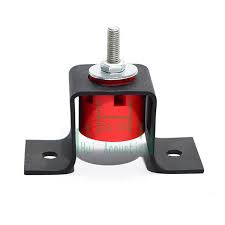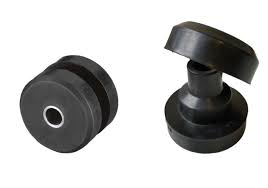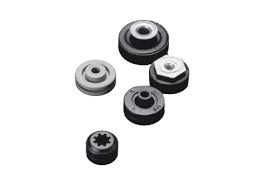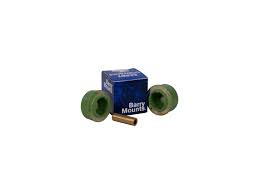Industrial vibration isolators are essential components for heavy machinery as they help minimize the transmission of vibration and noise, t...
Industrial vibration isolators are essential components for heavy machinery as they help minimize the transmission of vibration and noise, thereby ensuring smooth and efficient operation. Choosing the best industrial vibration isolators for heavy machinery is crucial for maintaining equipment performance, reducing maintenance costs, and ensuring the safety of workers. In this article, we will discuss the key factors to consider when selecting industrial vibration isolators for heavy machinery and provide insights on how to seismic isolated building choose the most effective isolators for specific applications.
Industrial vibration isolators for heavy machinery are designed to minimize vibrations, noise, and shock transmitted from equipment to the surrounding environment. When choosing the best isolators for your heavy machinery, several factors need to be considered. These include the weight and dimensions of the machinery, the frequency and amplitude of the vibrations, the type of mounting required, and the environmental conditions in which the machinery will be operating. There are various types of vibration seismic isolators for buildings isolators available, such as spring mounts, elastomeric mounts, and air mounts. Each type has its own advantages and is suitable for different applications. It is important to carefully assess the specific needs of your machinery and consult with a professional to determine the most appropriate type of isolator. In addition to the type of isolator, it is important to consider the material and design of the isolator. High-quality materials and innovative designs can significantly impact the performance and longevity of the isolators. It is crucial to select isolators that are durable and can withstand the harsh conditions often associated with heavy machinery operations. Furthermore, proper installation and maintenance of vibration isolators are essential to ensure their effectiveness. Improper installation or neglecting maintenance can lead to reduced performance and potential damage to the machinery. Ultimately, choosing the best industrial vibration isolators for heavy machinery requires careful consideration of various factors, as well as professional consultation and expertise. By selecting the right isolators and maintaining them properly, you can effectively reduce vibrations and protect both the machinery and its surrounding environment.
Choosing the best industrial vibration isolators for heavy machinery involves considering factors such as machinery weight, the frequency and amplitude of vibrations, mounting requirements, and environmental conditions. Various types of isolators, seismic isolation bearings such as spring mounts, elastomeric mounts, and air mounts, are available, each suitable for different applications. The material and design of isolators are also important, as they impact performance and longevity. Proper installation and maintenance are crucial for optimal performance and longevity. By carefully considering these factors and seeking professional consultation, you can select the right isolators to effectively reduce vibrations and protect machinery and its environment.
Understanding the Importance of Industrial Vibration Isolators

Industrial vibration isolators play a crucial role in protecting machinery and equipment from the harmful effects of vibration. By effectively dampening and absorbing vibrations, isolators help to reduce wear and tear on equipment, minimize noise levels, and prevent damage to surrounding structures. Properly selected and maintained vibration isolators can significantly extend the operational lifespan of industrial equipment, ultimately saving time and money for businesses. It is important for businesses to understand the various types of isolators available and how they can best be utilized to improve workplace safety and equipment performance.
Industrial vibration isolators are crucial in reducing the harmful effects of vibrations on industrial machinery and equipment. They work by absorbing and dissipating the energy produced by the vibrations, thereby minimizing the transmission of these vibrations to the surrounding environment. These isolators are used in a wide range of applications such as HVAC systems, motors, pumps, compressors, and other heavy machinery. They help protect the equipment from damage and premature wear and tear caused by constant exposure to vibrations. In addition to equipment protection, industrial vibration isolators also play a significant role in improving workplace safety and comfort. By reducing the transmission of vibrations, they help minimize the risk of injuries and fatigue among workers who operate or work in close proximity to vibrating machinery. Moreover, industrial vibration isolators contribute to enhancing the overall efficiency and performance of industrial equipment. By preventing excessive vibrations, they help maintain the proper functioning and accuracy of machinery, which ultimately leads to improved productivity and cost savings. Overall, understanding the importance of industrial vibration isolators is essential for maintaining a safe and efficient working environment while also prolonging the service life of valuable industrial equipment.
Choosing the Right Industrial Vibration Isolators for Your Equipment

Selecting the right industrial vibration isolators for your equipment is crucial to ensure maximum performance and durability. Factors to consider include the weight and size of the equipment, the frequency and amplitude of vibration, and the environment in which the equipment will be used. There are various types of vibration isolators available, including springs, rubber mounts, and air cushions, each offering different levels of isolation. It is important to carefully assess the specific needs of your equipment and consult with a vibration isolation expert to determine the most suitable isolators for your application. Additionally, regular maintenance and inspection of the isolators is essential to ensure optimal performance and to prevent equipment damage.
Maximizing Equipment Longevity with Industrial Vibration Isolators

Industrial vibration isolators play a critical role in maximizing equipment longevity by reducing the impact of vibrations on machinery. These isolators are designed to absorb and isolate vibrations, preventing them from transferring to surrounding equipment and structures. By minimizing vibration, isolators help to reduce wear and tear on machinery components, extending their operational lifespan. Additionally, industrial vibration isolators can improve equipment performance and reduce the need for costly maintenance and repairs. Overall, the use of vibration isolators is essential for protecting industrial equipment and ensuring long-term, reliable operation.
Common Misconceptions About Industrial Vibration Isolators Debunked

Some common misconceptions about industrial vibration isolators include the belief that all isolators are the same, that they are not necessary for all types of equipment, and that they are only needed for extremely heavy machinery. In reality, different types of equipment require different types of isolators, and all equipment can benefit from the use of vibration isolators to some extent. Additionally, even lighter equipment can generate enough vibration to cause damage if not properly isolated. It's important to consider the specific needs of each piece of equipment when selecting vibration isolators.
The Benefits of Upgrading Your Machinery with Industrial Vibration Isolators
Upgrading your machinery with industrial vibration isolators offers several benefits. These isolators are designed to reduce the transmission of vibrations from equipment to its surroundings, which can help to protect both the equipment and the surrounding environment. By reducing vibrations, these isolators can help to extend the lifespan of the machinery and minimize the need for repairs and maintenance. Additionally, they can also help to improve the overall performance of the equipment, leading to increased productivity and efficiency. Industrial vibration isolators can also contribute to a safer and more comfortable working environment for operators, by reducing the levels of noise and vibrations to which they are exposed. Overall, upgrading your machinery with vibration isolators can lead to cost savings, improved productivity, and a safer work environment.
Industrial Vibration Isolators: A Key Component for Workplace Safety
isolation mount
Industrial vibration isolators are essential components for workplace safety in numerous industries including construction, manufacturing, and transportation. These isolators are designed to reduce the transmission of vibrations and shocks in machinery and equipment, protecting both the machinery and the workers. They help to minimize the risk of equipment failure, reduce noise levels, and prevent potential injuries caused by excessive vibrations. Additionally, vibration isolators contribute to a healthier and more comfortable work environment, ultimately improving overall productivity and employee satisfaction. The selection of the right vibration isolator is crucial and should be based on factors such as the type of equipment, the level of vibration, and the specific workplace requirements. Investing in high-quality vibration isolators is an integral part of ensuring workplace safety and should not be overlooked.
Comparing Different Types of Industrial Vibration Isolators on the Market
Industrial vibration isolators are essential for reducing the amount of vibration and noise produced by industrial machinery and equipment. There are several types of vibration isolators available in the market, each with its own unique characteristics and benefits. Some common types of industrial vibration isolators include rubber mounts, spring mounts, and pneumatic mounts. Rubber mounts are cost-effective and provide good vibration isolation for lighter loads. Spring mounts are ideal for heavy equipment and offer excellent vibration and shock isolation. Pneumatic mounts utilize air springs to provide adjustable vibration isolation for a wide range of loads and frequencies. When comparing different types of industrial vibration isolators, it is important to consider factors such as load capacity, vibration frequency, environmental conditions, and installation requirements. Additionally, it is crucial to assess the specific needs of the application and the level of vibration isolation required. Overall, selecting the right type of industrial vibration isolator is crucial to ensure optimal performance and longevity of industrial equipment, as well as to maintain a safe and comfortable working environment for employees.
How to Properly Maintain and Inspect Your Industrial Vibration Isolators
Inspect the industrial vibration isolators regularly for any signs of wear, damage, or misalignment. Look for cracks, tears, or deterioration in the rubber or other components. Check that the isolators are properly installed and that all mounting bolts are secure. Clean the isolators as needed to remove any built-up debris or contaminants that could affect their performance. Use mild soap and water to gently scrub the surfaces, taking care not to damage the material. Inspect the surrounding area for any potential sources of vibration or shock that could impact the isolators' effectiveness. Address any issues that could contribute to excessive vibration or cause damage to the isolators. Regularly monitor the performance of the vibration isolators and schedule routine maintenance as necessary. This may include re-tensioning or replacing components, re-aligning the equipment, or making other adjustments as needed to ensure optimal performance and longevity. Keep detailed records of all inspections, maintenance, and any issues that arise with the industrial vibration isolators. This can help identify trends or potential areas for improvement, as well as provide documentation for compliance and warranty purposes.
In conclusion, choosing the best industrial vibration isolators for heavy machinery is crucial in ensuring the smooth and efficient operation of equipment while minimizing the risk of damage and wear. By evaluating the specific needs of the machinery and selecting the appropriate isolators, businesses can protect their investments and improve workplace safety. Industrial vibration isolators play a key role in maintaining the performance and longevity of heavy machinery, making them a critical component for industrial operations.
See also
https://www.gmt-rubber.com/vibration-isolators https://www.rubberfab.com/products/anti-vibration-mounts/ https://www.globalindustrial.com/t/material-handling/vibration-dampers/vibration-isolators
